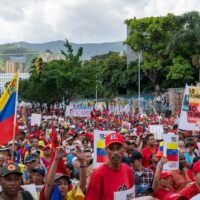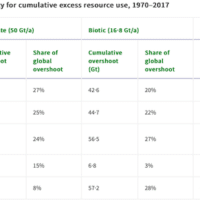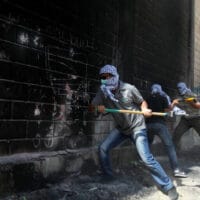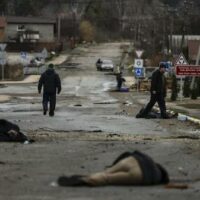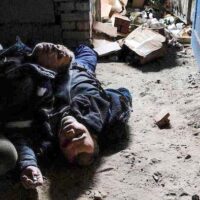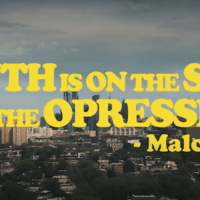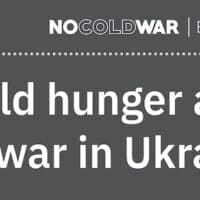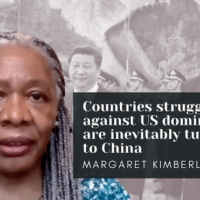-
Venezuela’s economy will grow 20% in 2022, despite illegal U.S. sanctions, predicts Western bank
Major Switzerland-based bank Credit Suisse forecasts Venezuela’s real GDP growth to be 20% in 2022 and 8% in 2023. This is despite an illegal U.S. blockade, which starved the government of 99% of its revenue, according to the top UN expert on sanctions.
-
An antidote to the “split” in the U.S. Peace Movement: anti-interventionism
Massachusetts Peace Action, a venerable part of the U.S. Peace Movement, has been around since the 1980s and its predecessors date back to the 1950s. Its voice is heeded and it represents most of the shared opinions of the liberal and progressive U.S. peace movement.
-
National responsibility for ecological breakdown: a fair-shares assessment of resource use, 1970–2017
We propose a novel method for quantifying national responsibility for ecological breakdown by assessing nations’ cumulative material use in excess of equitable and sustainable boundaries.
-
The billion dollar deal that made Google and Amazon partners in the Israeli occupation of Palestine
“We are anonymous because we fear retaliation.” This text was part of a letter signed by 500 Google employees last October, in which they decried their company’s direct support for the Israeli government and military.
-
Biden’s budget cements turn towards war, police
On Monday, President Joe Biden unveiled his 2023 budget, calling for dramatically increased funding for war and the police while allocating all-too-little funding for social services. Out of the total $1.58 trillion of spending outlined in the budget, $813 billion is allocated to the military while $769 billion is allocated for non-military spending. This is a $31 billion increase in funding for the war machine.
-
Harvard Law School ‘apartheid’ report leaves Israel’s defenders speechless
Harvard Law School’s International Human Rights Clinic’s recent report declaring that Israel is practicing apartheid is a victory for Palestinian human rights.
-
Staged massacre in Bucha
The city of Bucha, in Ukraine, has recently come to the attention of the U.S. and EU corporate media, for the purpose of criminalizing Russia for the supposed assassination of 300 civilians. However, the lack of evidence for these claims brings into doubt any allegations that the Russian military was involved.
-
IPCC report calls for ‘immediate and deep’ carbon cuts to slow climate change
Current pledges to cut emissions won’t be enough to slow climate change, according to a new report from the United Nations’ Intergovernmental Panel on Climate Change (IPCC).
-
‘Indian Rivers are in ICUs, Drying up Fast’ — Waterman Rajendra Singh
“Twenty-one Indian cities are going to be waterless very soon,” Rajendra Singh tells me in an interview for NewsClick conducted last week in Delhi. Singh is alluding to a prediction in a Niti Aayog report on water. He says, “It means that the underground and surface water availability will become zero.” Another report says 72% of water reservoirs are in overdraft.
-
U.S. biggest spoiler of Ukraine situation, European security
After the latest round of talks between Russia and Ukraine in Turkey on Tuesday, both sides said the negotiations released positive signals. Ukraine proposed adopting neutral status in exchange for security guarantees from the international community. Russia said the country would sharply cut military activity around Kiev and Chernihiv.
-
The problem with ‘Don’t Say Gay’: Children aren’t asking about sex. They’re asking about love.
Queer advocates worry how the ‘Don’t Say Gay’ bill, set to go into effect in Florida, could impact education on gender diversity and sexual orientation of young Canadians.
-
Questions abound about Bucha massacre [Warning Graphic Images]
The West has made a snap judgment about who is responsible for the massacre at the Ukrainian town of Bucha with calls for more stringent sanctions on Russia, but the question of guilt is far from decided, writes Joe Lauria.
-
New McCarthyism silences the Black and other Radical Left
Socialists, anti-imperialists, anti-war activists, Black radicals, and other independent alternative voices who challenge mainstream media and its political culture are being explicitly targeted by Liberals and Big Tech in a censorship campaign akin to the McCarthy era.
-
‘Gods of War’: How the U.S. weaponized Ukraine against Russia
Since the U.S.-engineered 2013-14 coup in Ukraine, American forces have taught Ukrainians, including neo-Nazi units, how to fight in urban and other civilian areas. Weaponizing Ukraine is part of Washington’s quest for what the Pentagon calls “full spectrum dominance.”
-
Pundits who advocate hot war with Russia are enemies of humanity
In an appearance on the MSNBC show Velshi, The Modern War Institute’s John Spencer explicitly advocated direct U.S. military conflict with Russia due to allegations of war crimes in the Ukrainian city of Bucha.
-
Fake news in Kiev heralds cruel April
An indignant Moscow has angrily demanded a United Nations Security Council meeting on Monday over the allegations of atrocities by Russian troops in areas around Kiev through the past month.
-
‘We Know They Lied’
A system that is racist, regressive and punitive for nothing more than profit and control! We must #StopTheAbuse of the American people, and in turn the world – the struggle begins at home!…
-
‘Don’t say gay’: anti-equality legislation spreading state by state in the US
Florida’s anti-LGBTQ bill and Texas’s ban on abortion after six weeks shows that political battles at state level are more important than ever.
-
Briefing: World hunger and the war in Ukraine
The New Cold War is rapidly heating up, with severe consequences for people around the world. Our new series, Briefings, provides the key facts on these matters of global concern.
-
Countries struggling against U.S. domination are inevitably turning to China
Greetings everyone. Of course I want to start by thanking Friends of Socialist China for inviting me to participate in this meeting today. When I received the invitation in early February I didn’t know, I don’t think anyone knew, that the world would change irrevocably just a few weeks later.

